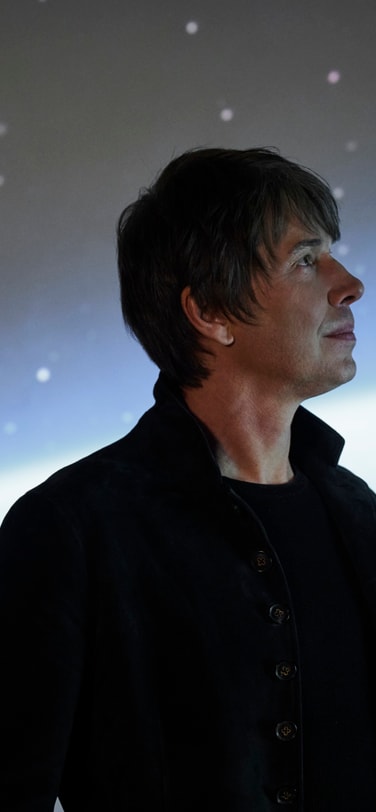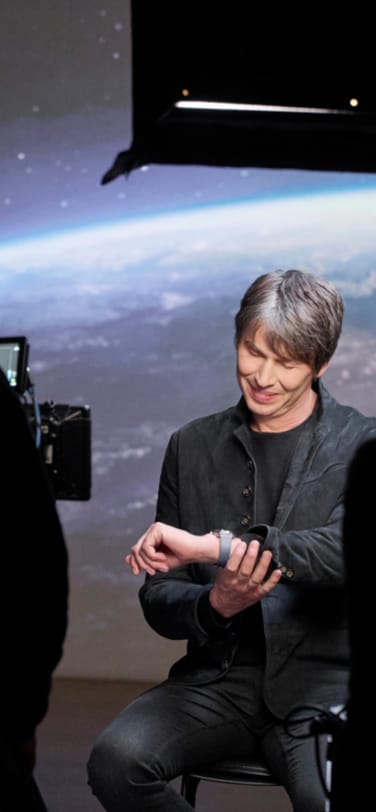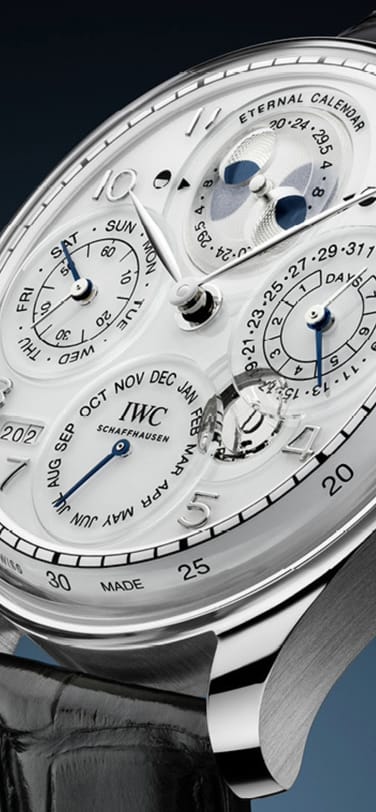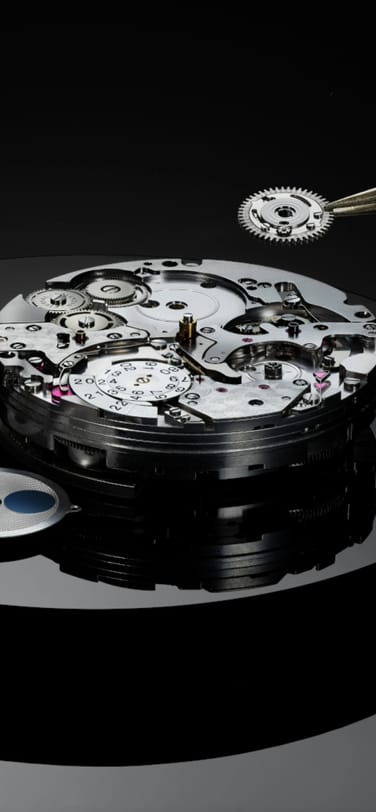Creators & Partners
TIME UNRAVELED - A CONVERSATION WITH BRIAN COX
RENOWNED PHYSICIST AND TV HOST, PROFESSOR BRIAN COX, TAKES US ON AN EXCITING JOURNEY TO UNDERSTAND THE NATURE OF TIME AND SPACE. FIND OUT MORE.
Read Time: 5 min


Brian Cox, particle physicist and professor at the University of Manchester, contemplates time and its origins and the philosophical challenges associated with an eternal universe. He also explains that, fundamentally, we don’t know what watches measure – and why observing the seconds hand on the dial opens the door to the most profound mysteries about space and time.
Listen to our latest podcast with Brian Cox on time and eternity.
BEAUTY OF THE UNIVERSE
WHAT MAKES MECHANICAL WATCHES FASCINATING FOR YOU?
There’s such a big difference between a mechanical object measuring the passing of time and your phone doing this. You see the second hand on your watch, but what does that hand represent? If you were to ask Einstein, he would say it measures the distance you travel over space-time. If you asked an expert in thermodynamics, they would say that it has something to do with entropy and that your watch is ultimately measuring the universe’s unraveling.
It is like a doorway to profound questions and deep mysteries. To me, this makes clocks and watches wonderful things. Because, at the most fundamental level, we do not know what they are actually doing. There is always a deep mystery when you look at your watch - a mystery that is intertwined with space and time and the structure of the universe itself.
IF YOU COULD WISH FOR IWC SCHAFFHAUSEN’S NEXT COMPLICATION – WHAT COULD IT BE?
If we assume that a watch is a measuring device, what if it could measure its own age? Imagine something like a chronograph that you start once and never stop again. Even if they run perfectly accurately, all these watches would measure a unique age. At some tiny level, of course, but each would record something different. They would all be perfectly synchronized when leaving the factory but come back with different ages. Because they will have taken a different path over space-time on the wrists of their owners, a different route between events. Because that is how beautiful our universe is.

“A DAY WITHOUT A YESTERDAY”
WHAT IS TIME?
As with many simple questions, the answer is not that simple. The short answer is we don’t know. In the 17th century, Sir Isaac Newton assumed there was something like a great clock in the sky, and everybody’s time ticked at the same rate. In 1905, Albert Einstein showed us with his theory of relativity that this is not the case. Time runs at different speeds for different people in different places, whether you are accelerating relative to somebody else or whether you take a different route between things that happen.
DOES TIME EVER STOP?
If you were to throw a watch into a black hole, it would stop ticking and freeze forever. On what we call the “event horizon” of a black hole, time ceases. But only when viewed from the outside. If you fell into the black hole with your watch, it would keep ticking at one second per second. Immediately, you realize that time is more complicated. It is a modern research area in physics. Einstein once famously said: Time is a thing that watches measure.
WHEN DID TIME BEGIN?
There is an idea in physics called the thermodynamic arrow of time. It says there only is a difference between the past and the future because a strange thing happened in the past: the Big Bang, the origin of our universe. According to this, the Big Bang 13.8 billion years ago would mark the beginning of time. But we are not sure that this was the moment when time began. We don’t know if the universe even had a beginning. As the famous astrophysicist and priest Georges Lemaître put it, this would imply that there was “a day without a yesterday.”
LET’S GET INTO THE BIGGER PICTURE: WHAT IS ETERNITY?
In our current baseline model of the universe, we understand that the universe is not only expanding, but it is expanding at an accelerating rate. If the universe continues to do that, we will reach a point when everything is so far apart from everything else, and the temperature of everything is the same. Technically, we would say that entropy always increases as the universe goes from a highly ordered state to something more messy. However, one of the things that we know about a clock is that it is a thermodynamic device. To build a clock, you need a temperature difference. In the far future, we will reach a point when no more temperature differences exist in our universe. I suppose that, then, time will have gone.
“If you wear a watch, you will always see it tick at one second per second. That is the time in your frame of reference. Somebody else might go to different places and do different things. And when you meet them again and compare watches, you will have aged at different rates.”

TIMING OF A SYMPHONY
IS A MINUTE ALWAYS A MINUTE, A SECOND ALWAYS A SECOND?
There is a certain amount of time that, say, a performance of Mahler’s 9th Symphony takes. And that is the time measured on a watch sitting still relative to the orchestra. If you carried that watch out of the concert hall, walked around, and then came back again, the watch would have measured slightly less time between the start and the end of the symphony.
This does not mean the watches are not precise. Quite the opposite. The watches faithfully and accurately measure the amount of time between the beginning and end of the performance. Rather time itself runs differently for the two watches. In relativity, and in reality, your time is personal to you. These are tiny differences, of course, unless the watch is traveling close to the speed of light. Then, the difference would become quite substantial.
THE MORE WE ACCELERATE, THE SLOWER TIME PASSES.
In the Large Hadron Collider (LHC) at CERN in Geneva, we make protons go around the particle accelerator at 99,999999 percent the speed of light. They travel around the 27-kilometer ring 11’000 times per second at that speed. For the protons, however, time passes 7000 times more slowly. One second for us would equal one seven thousandth of a second for them.
But from the particle’s point of view, their watch would still tick at one second per second. You might say that this is a contradiction, but it is not. Because the flip side is that from the particle’s perspective, the circumference of the accelerator ring shrinks from 27 kilometers to 4 meters. The outcome is the same. Space and time are being traded; they are mixed up. That is just another way of thinking about relativity.
SO, IS THE TIME I READ ON MY WATCH VALID JUST FOR MYSELF?
In Einstein’s theory, there is a thing called proper time. If you wear a watch, you will always see it tick at one second per second. That is the time in your frame of reference. Somebody else might go to different places and do different things. And when you meet them again and compare watches, you will have aged at different rates. But that person, in their frame of reference, will always see time tick at one second per second.

BEHIND THE MEANING OF “WORLD LINE”
HOW CAN TIME PASS AT DIFFERENT SPEEDS FOR DIFFERENT PEOPLE?
Einstein’s theory of relativity is concerned with events. Clicking your fingers is an event; lighting a candle is an event. We are sitting here and speaking to each other. This is an event. We could say: next year, we will meet again and then let us find out who will have aged the most. And there is an answer to that question: it depends on the route each of us took over space-time.
The route we take between different events gives us a defined length of our path. And that length is the time measured on our watches. In that sense, a watch is not a time-keeping but rather a distance-measuring device. It is similar to asking: what is the distance between Schaffhausen and London? It depends on how you travel there.
CAN YOU ILLUSTRATE WITH AN EXAMPLE WHAT SPACE-TIME IS?
The picture I developed of space-time over the years and am teaching to students is that of a map. Think about space-time as a collection of all events – all the things that happen in space and time in our universe. And now imagine putting points on your map. There is a line you follow from one event to another, a route you take over the map. And that is called your world line. As we wander across the map, our watches measure the length of our world line.
IF TIME CAN BE UNDERSTOOD AS A DISTANCE, HOW FAR DO WE TRAVEL IN A LIFETIME?
In Einstein’s theory, how far we travel over space-time is our age. It’s a straightforward answer. If you live for 77 years, six days, and 3 seconds, that is how far you have traveled, which is a beautiful thing. Quite literally, your age is the distance you travel over space-time.

A SENSE OF TIME AND SPACE
IS THE WORLD LINE MAPPED OUT FROM THE BEGINNING? OR IS IT FORMING AS WE TRAVEL?
If you take Einstein’s theory at face value, then all of space-time is already on the map. Not just the past but also the future. There is this idea of a block universe, which understands space-time as an unchanging four-dimensional block – as opposed to a three-dimensional space that continuously modulates as time passes. But some physicists think that the future is somehow built up. The thing we are approaching here is called a quantum theory of gravity. Gravity is the curvature of space-time, intimately related to space and time. However, everybody seems to agree today that there probably should be some deeper theory.
WHAT COULD THAT THEORY LOOK LIKE?
We are beginning to suspect that space and time emerged from something else that does not have space and time in it. An analogy would be human consciousness. You could think about human beings as collections of atoms that obey the laws of nature. And out of that emerges something new, something different.
This idea that we can look at a watch and find it beautiful – what is that? Whatever it is, it emerges from something that does not have “beauty” in it. In the same way, we are beginning to believe that there is a deeper picture, which could be string theory or some quantum theory of objects interacting. And, somehow, a sense of space and time emerges out of that.
THANK YOU, BRIAN, FOR THIS MIND-BENDING JOURNEY INTO A PHYSICIST’S BRAIN!
For a deeper dive into all things time and the universe, explore our latest podcast episode.